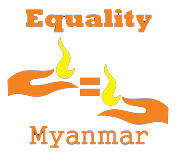Equality Myanmar (EQMM) is a leading nongovernmental organization that organises a wide range of human rights education and advocacy programs, the documentation human rights violations, and provides emergency support for activists, human rights defenders, and their families. We work with a range of local civil society organizations, educators, activists, various local actors, and our programs and activities reach all states and regions in Myanmar.
Equality Myanmar stands strong for professional commitment, despite the organization having faced a critical situation in 2021 due to the political crisis.
“EQMM envisions a peaceful, tolerant and federal democratic society built on respect for the dignity and human rights for all in Myanmar.”
“Our mission is to promote a culture of human rights compliance and accountability where Myanmar people are empowered to access their rights, and justice and engage in a process of social and political transformation.”
Goal – The Strengthening of human rights culture, justice, accountability, and advocacy mechanisms in Myanmar.
Our target groups
The strategic selection of target groups is aimed at empowering individuals that have the potential to promote change within their organizations, communities, and constituencies.
Our human rights education trainings and workshops target a range of sectors with a specific focus on community leaders and representatives from civil society organizations, including women’s groups, student unions, LGBT activists, political activists, ethnic and religious minority groups, teachers, and farmer and labor unions.
The selection of beneficiaries and partners is rooted in the belief that the development of a human rights-based perspective is critical to all sectors and demographics of civil society, and a necessary step in the promotion of equality and justice.
Methodology
Equality Myanmar’s education initiatives utilize a learner-centered, non-formal approach which draws on fifteen years of institutional experience. The methodology emphasizes transformative learning which occurs at three levels: cognitive, attitudinal, and behavioural. Cognitive change is grounded in knowledge acquisition and awareness raising, as developed through the participants’ understanding of human rights principles, theories, and application. Attitudinal transformation refers to the participants’ beliefs and values, and focuses on encouraging the promotion of rights by fostering a sense of empowerment and engagement. Behavioral transformation is manifested through participants’ actions, including mobilization and action planning, community organizing, and documentation of human rights violations. Collaboratively, these stages function to empower the people of Myanmar to identify and analyze the social problems present in their communities and subsequently initiate rights-based solutions in response.
As a result of individuals’ cognitive, attitudinal, and behavioural transformations, human rights education has a direct impact on target communities, in particular through the organization of community members around a common theme, such as forced relocation, domestic violence, child soldiers, forced labor, and other issues pervasive in communities throughout Myanmar. EQMM’s human rights education modules are developed and updated within the framework of Myanmar’s social, cultural, and political context in order to ensure the human rights principles’ relevance, usefulness, and applicability. Providing training participants with practical tools to follow-up on human rights abuses strengthens both their autonomy as well as their capacity for social transformation and civic engagement.
EQMM’s strategic selection of target groups is aimed at empowering at the community level with a focus on groups that have a potential to promote change within their communities and constituencies. The selection of beneficiaries and partners is rooted in the belief that the development of a human rights-based perspective is critical to all sectors and demographics of civil society, and a necessary step in the promotion of equality and justice. As such, EQMM aims to mitigate conflicts between communities and bridge social, cultural, and ethnic divides by encouraging the participation and collaboration of diverse groups in human rights-awareness raising activities.
The participants of EQMM’s training courses act as the central force for EQMM’s expanding network of human rights activists inside Myanmar. Through the center-based training model, senior trainers serve as multipliers of human rights knowledge critical to Burmese civil society. By targeting different sectors, trainers are able to specify material to empower participants in becoming spokespeople within their respective communities and places of employment. With every completed training, the community of people within Myanmar who respect and understand human rights grows, moving one step closer to EQMM’s goal of building a national culture of human rights.

 Equality Myanmar (EQMM) is a leading nongovernmental organization that organises a wide range of human rights education and advocacy programs, the documentation human rights violations, and provides emergency support for activists, human rights defenders, and their families. We work with a range of local civil society organizations, educators, activists, various local actors, and our programs and activities reach all states and regions in Myanmar.
Equality Myanmar (EQMM) is a leading nongovernmental organization that organises a wide range of human rights education and advocacy programs, the documentation human rights violations, and provides emergency support for activists, human rights defenders, and their families. We work with a range of local civil society organizations, educators, activists, various local actors, and our programs and activities reach all states and regions in Myanmar.